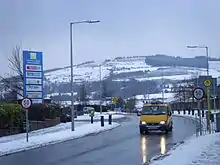Winter of 2010–11 in Great Britain and Ireland
The winter of 2010–11 was a weather event that brought heavy snowfalls, record low temperatures, travel chaos and school disruption to the islands of Great Britain and Ireland. It included the United Kingdom's coldest December since Met Office records began, with a mean temperature of −1 °C (30 °F), breaking the previous record of 0.1 °C (32.2 °F) in December 1981. It was also the second coldest December in the narrower Central England Temperature (CET) record series which began in 1659, falling 0.1 °C short of the all-time record set in 1890.[1] Although there are no xx, December 2010 is thought to be colder than December 1890 over the United Kingdom as a whole, as Scotland was up to 2 °C warmer than England. Hence, it is thought to be the coldest December across Great Britain since before 1659.[2]
| Winter of 2010–11 | |
|---|---|
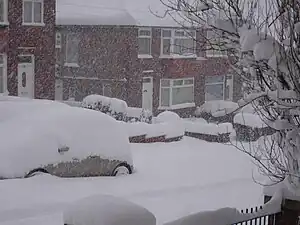 Snow falling in Sheffield, South Yorkshire; 1 December 2010 | |
| Seasonal boundaries | |
| First event started | 24 November 2010 |
| Last event concluded | 13 March 2011 |
| Seasonal statistics | |
| Maximum snowfall accumulation | 1.5 m (5 ft) at Sheffield, United Kingdom |
| Total fatalities | 20 total |
| Total damage | Unknown |
| Related articles | |
The winter of 2010 in England saw the earliest widespread winter snowfall since 1993 with snow falling as early as 24 November across Northumberland and North Yorkshire. A maximum snow depth of 76 cm (30 in) was recorded on 1 December in the Peak District, Sheffield, Doncaster, the Cotswold Hills and the Forest of Dean. In this event Scotland and Northern England were most severely affected. On 9 December temperatures recovered across much of the UK, causing a partial thaw.
Later, on Thursday 16 December a cold front reintroduced a cold, arctic airstream. This cold spell brought further snow and ice chaos back to Ireland and Britain with Southern England, Wales, the Republic of Ireland (excluding the westerly coastal regions) and Northern Ireland bearing the brunt of the wintry conditions. This led to severe disruption to the road and rail network with several airports being closed including London Heathrow Airport for a time. Several local temperature records were broken including a new record low for Northern Ireland of −18.7 °C (−1.7 °F) recorded at Castlederg on 23 December 2010.
By the new year a thaw had begun, and there was no recurrence of the extreme conditions for the remainder of the winter. There was some snowfall in early January, and there was an anticyclonic spell at the end of the month that brought some cold, frosty days. February was above average in temperature and ended on a mild note, although the snow returned in much of Scotland during March.
Background
During the latter part of November, northern blocking established over Greenland which resulted in the jet stream moving south, allowing cold air to flow in from the east. Forecasters warned of the potential for severe winter weather from weeks in advance[3] and the Government stated that they were prepared for winter weather after the previous British winter of 2009–2010 caused widespread disruption. The cold weather arrived in Britain and Ireland on 22 November and by 24 November, snow showers brought by a stiff northerly wind fell over the North East of England and Northern and Eastern Scotland which resulted in 10–20 cm (4–8 in) locally and gridlock in many of the major roads within Aberdeen during the evening rush hour of 24 November.
In the following days, the snow fell far more widely leading to widespread travel disruption, school closures and cancellation of sporting fixtures. The Met Office confirmed that it was the most widespread snowfall in the United Kingdom for 17 years. By 2 December, most of the United Kingdom and much of Ireland was covered with snow, accumulations in the north and east of Scotland and England were over 50 cm (20 in) in places, with over 1 m (39 in) of snow lying on much of the Scottish mountains. Snow depths elsewhere were between 5–30 cm (2–12 in) widely. Temperatures fell widely below −10 °C (14 °F) with some areas staying sub-zero by day. On 2 December there was particularly low temperatures in major towns and cities, particularly in Scotland where it dropped to −18 °C (0 °F) in Aberdeen and on 3 December temperatures in England broke records. However, the lowest temperature of the winter of −21.2 °C (−6.2 °F) was recorded at Altnaharra, Sutherland at 10 am on 2 December and Braemar and Kinbrace both dropped to −20 °C (−4 °F) on the night of 2 December. 7 people have been confirmed to have died due to the cold weather.
Reported effects
Deaths
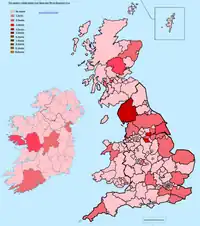
- On 30 November in Newport, South Wales a man was found dead in the street—it was assumed that he froze to death after collapsing with a heart attack.[4]
- Two old-age pensioners were found in the snow in their gardens dead from hypothermia at the beginning of December.[5]
- On 2 December two teenage girls died in a car crash caused by ice on the A595 in Cumbria.[6]
- On 6 December a 70-year-old man was found dead in the snow in a caravan park in Cleethorpes,[7] and a man died trying to clear snow outside his home in Darlington, County Durham.[8]
- There were several deaths on 18 December: a 17-year-old boy from Bilsington, Kent, was killed when his car left the road;[9] two pedestrians died after being hit by a Range Rover in Glasgow;[9] a woman in her 60s from the Inverness area, was killed in a three-vehicle pile-up in Huntly, Aberdeenshire;[9] and a man in his early 30s suffered life-threatening injuries when his Mini was in a crash with a highways vehicle near Eastbourne, East Sussex, and died after an ambulance being driven by a police officer left a country road in poor weather conditions and careered into a bush on Standard Hill, in Ninfield.[9]
- On 19 December there were several more deaths. A 33-year-old man died after falling through the ice on Doggetts Lake in Rochford, Essex;[10] a road crash killed 16-year-old James Doran and Jordan Kenny when the car they were travelling in lost control on an icy road in Liverpool and ploughed into a garden wall;[10] a 15-year-old girl died in a sledding accident in Douglas, County Cork, Ireland;[11] and a 35-year-old woman and her 9-year-old son were killed in a car crash caused by ice and snow near Castlebellingham in County Louth, Ireland.[12]
- On 22 December, a 48-year-old man died from hypothermia, after sleeping overnight in the Bible Gardens, behind the cathedral in Bangor, North Wales.[13]
Economy
The severe cold spell came in the run up to Christmas and was estimated to cost the British economy up to £1.2 billion a day[14] with a total cost of £13 billion.[15] Retailers were particularly badly hit by lost sales with footfall down nearly 20% compared to the same period the previous year and as much as 30% in the West Midlands and South East.[15] Some experts suggested that it may have a knock on effect in delaying or reversing economic growth.[14] Christmas is usually the most profitable period for the pub and restaurant industry, however, due to disruptions to delivery routes, numerous stock outs and disappointing trading updates were reported.[16]
Road
On 1 December the M1 motorway was temporarily closed, and the Forth Road Bridge was closed for over ten hours due to heavy snowfall. This was the first time the bridge had been closed because of snow.[17] The same day, the A57 was closed in the evening between Anston and Worksop and over 100 motorists were stranded overnight.[18] Thousands of motorists across Sheffield became stranded on 1–7 December as up to as much as 61 cm (2 ft) of snow fell on the city with severe disruption across the county of South Yorkshire including the suspension of all bus services for 24 hours. On 6 December, vehicles were trapped on the M8 for over 10 hours, and more than 1,000 vehicles became stuck on the M876.[19]
Rail
Eurostar rail services to the continent were cancelled on 20 December causing severe delays with queues at St Pancras station stretching more than 800 metres (1⁄2 mi) as far back as the British Library. At the same time. services were cancelled on the East Coast Main Line between London and Peterborough due to damage to overhead power cables caused by accretion of ice.
Air
At Newcastle Airport, a plane overshot its target stop position on the runway, but remaining on the hard surface. This caused the airport to be temporarily closed. No passengers were injured.[20] Gatwick Airport and Edinburgh Airport were closed all day on 1 December due to heavy snow.
Other effects
7,000 schools in the UK were closed on 2 December.[21]
Timeline
November 2010
In late November, a snow storm had moved from southern Sweden, reaching Northumberland and the Scottish Borders Region during 23 November.[22] The Met Office issued a number of weather warnings, and snow began to fall in the early evening of 24 November, with 2 inches (5 cm) recorded in Newcastle upon Tyne.
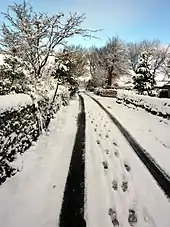
By 26 November, nighttime temperatures fell well below 0 °C (32 °F), with the Welsh towns of Sennybridge and Trawscoed being among the coldest places at −10.2 °C (13.6 °F). The cold snap heralded the earliest winter snow fall for 17 years.[23] The AA dealt with an estimated 15,500 calls regarding breakdowns on the same day.[24] The night of the 26/27 November saw a thunder storm damage electrical systems and flood roads, causing disruption transport services on 27 November, including to trains in Dublin.[25] Elsewhere in Ireland, the Irish Insurance Federation revealed there were 22,450 claims from the public, the majority of which involved snow or ice damage to people's homes.[25] The DART and the northern commuter and Maynooth commuter lines were not running and Belfast and Rosslare train services out of Dublin were also affected. The main runway at Dublin Airport due to snow and ice for most of the day.[25]
Later in November, the Met Office's warnings remained in place across much of the UK, with Scotland and North East England predicted to have the heaviest snowfalls, with new warnings in place for icy roads in Northern Ireland and Wales.[26] Snow was causing problems on some roads, with gritters deployed as temperatures dipped to -3 °C (27 °F).[24] The AA reportedly faced a 40% increase in call-outs, compared to an average November.[27] Motorists in Wales and Northern Ireland struggled with icy roads while Scotland was facing more heavy snow and drifts thanks to a biting wind.[27]
The CET (Central England Temperature) was −4.0 °C (24.8 °F) on 28 November, the lowest November CET mean since −4.6 °C (23.7 °F) was recorded on 24 November 1904.[28] The lowest temperature of the month was also recorded on this day, with −17.5 °C (0.5 °F) recorded at Llysdinam, Wales. The Met Office at RAF Linton-on-Ouse in North Yorkshire recorded a record low for November of −11.2 °C (11.8 °F); earlier that month on the 4th it had recorded a record maximum for November of 17.6 °C (63.7 °F).[29]
December 2010
According to the Manley Central England Temperature record (beginning in 1659), the second-coldest December ever recorded in central England. Also the coldest December in the UK since UK records began in 1890, and the coldest December in Ireland since official records began.
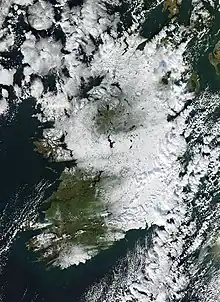
In early December, a minimum of −21.1 °C (−6.0 °F) was recorded at Altnaharra, Scottish Highlands. A band of snow moving north affected Lincolnshire, Nottinghamshire, South and West Yorkshire, giving significant accumulations here, with further frequent heavy snow showers to North East England and Eastern Scotland. Up to 40 cm (16 in) of snow was recorded in Rotherham and Sheffield, 20 cm (8 in) of fresh snow in Mansfield[30] (bringing total depths to over 30 cm), 20 to 30 cm (8 to 12 in) in Leeds, 30 cm (12 in) in Pontefract and up to 40 cm (16 in) in parts of Lincolnshire.
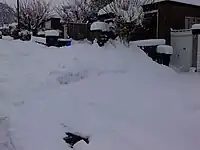
On 3 December, an all-time record low of −17.9 °C (−0.2 °F) recorded at RAF Leeming (since records began at Leeming in 1945) and −19.0 °C (−2.2 °F) at RAF Topcliffe in North Yorkshire.[31]
By 6 December, snowfall in the Central Belt in Scotland led to the closure of the M8 motorway for two days with hundreds of motorists stranded overnight. The resulting political furore led to the resignation of Scottish Minister for Transport, Stewart Stevenson.[32]
By mid-December, a cold front reached the Shetland Isles and moved southwards across Scotland. Mild air preceded the front, with cold air straight from the Arctic following it, resulting in some rapid temperature drops throughout Scotland and its Isles. An unofficial temperature of 11.6 °C (52.9 °F), the highest of the month so far, was recorded near Lairg, Scottish Highlands at around 7pm in the milder air.[33] The cold front continued to move southwards across the UK passing Northern Ireland and Northern England.
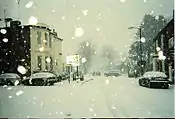
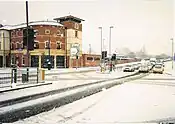
Later in December, the M5 became gridlocked, and shops in the Birmingham area closed early on the last Saturday before Christmas. A number of passengers travelling by coach had to spend the night at Birmingham Coach Station due to not only coaches for onwards destinations being unable to depart and arrive Birmingham, but also widespread disruption to train services making onwards alternatives impossible. Airports including Heathrow Airport closed some its runways for a time, with Gatwick also cancelling a number of flights.[34][35]
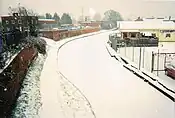
A minimum temperature of −19.6 °C (−3.3 °F) was recorded in Shawbury, Shropshire.[36] And a minimum temperature of −17.6 °C (0.3 °F) was recorded at Castlederg, a new record for Northern Ireland and −19.6 °C (−3.3 °F) was recorded at Chesham, Buckinghamshire.[35] Heavy snow fall was also reported over large parts of Devon causing major travel disruption.[37] Dublin Airport and City of Derry Airport were forced to fully close, 15 cm (6 inches) of snow was recorded at Dublin Airport.[38] Only three days after breaking the record minimum for Northern Ireland, Castlederg broke the record again with a low of −18.7 °C (−1.7 °F).[39]
On 24 December, it was decided to cancel the 27th IRFU's Celtic League meeting with Leinster as Ulster's Ravenhill pitch froze under heavy snow. Both northern and southern Ireland were under heavy snow.[40]
25 December 2010 was also the coldest Christmas Day since 1830, with a CET of −5.9 °C (21.4 °F).[41] The Republic of Ireland's lowest-ever December temperature on record was also recorded on Christmas Day, at −17.5 °C (0.5 °F) at Straide, County Mayo.
At the end of December, thousands of homes and businesses in Northern Ireland and Wales were without water as melting snow and ice revealed many burst pipes. Northern Ireland Water said it was alternating supplies from reservoirs in order to help alleviate the crisis in which some properties had been without supplies since before Christmas.[42]
January 2011
January again was colder than average across the UK, though much milder than December, with a mean temperature across the UK of 3.1 °C (37.6 °F).[43] In contrast to December, it was dry across most of the country (except South East England which was wetter than average[44]). It had more frost than average across most of the UK.[45] However, freezing rain caused disruption in Shropshire, and Greater Manchester experienced heavy overnight snow which affected travel on the morning of the 4th.[46] and snow fell in the West Midlands and parts of Wales, Cheshire and Lancashire on 7 January.[47]
Welsh flood warnings stay in place in four areas, with roads closed after heavy bursts of rain affecting Conwy and Gwynedd. By 15.55 GMT, there were four flood warnings and six flood alerts 16 January 2011.[48]
February 2011
February was a mild month (the 9th mildest in the last century[49]) with very little frost and much of the country having its first snow-free February since 1998. The only significant wintry weather came on the 18th-21st when some overnight dustings of snow fell as far south as the Midlands.
March 2011
Heavy snow once again started to cover parts of Scotland, affecting travel from 9 March,[50] with fresh snowfalls bringing more travel disruption on 12 March.[51] Persistent snow affected much of the Highlands of Scotland during the 12th-13th of the month, with reports of 40 cm (16 in) of lying snow near Fort William and 60 cm (24 in) of lying snow to the north of Aviemore, with severe drifting.[52]
Weather statistics and records
In Ireland it was the coldest month since records began and in the UK it was the coldest December since Met Office records began in 1910, with a mean temperature of −1 °C (30 °F). It broke the previous record of 0.1 °C (32.2 °F) in December 1981.
December 2010 has the lowest CET, −0.7 °C (30.7 °F),[53] since a CET of −1.1 °C (30.0 °F) was recorded for February 1986. December 2010 can also be confirmed to be the coldest December for 120 years, since a monthly CET of −0.8 °C (30.6 °F) was recorded for December 1890 and the second-coldest December since records began in 1659. Probably the most notable record of the winter is the new all-time record low for Northern Ireland, of −18.7 °C (−1.7 °F) recorded on 23 December at Castlederg, County Tyrone. In addition, all of these sites recorded their all-time record lows since recording began, this winter:[54]
- Andrewsfield at −13.8 °C (7.2 °F) on 20 December
- Aultbea at −8.5 °C (16.7 °F) on 18 December
- Ballykelly at −13.3 °C (8.1 °F) on 23 December
- Belfast Aldergrove Airport at −14.9 °C (5.2 °F) on 21 December
- Capel Curig at −17.5 °C (0.5 °F) on 20 December
- Carlisle lowest maximum of −7.9 °C (17.8 °F) on 8 December[55]
- Church Fenton at −17.5 °C (0.5 °F) on 3 December
- Cranfield at −12 °C (10 °F) on 20 December
- Crosby at −17.6 °C (0.3 °F) on 21 December
- Dishforth at −15 °C (5 °F) on 6 December
- Dunkeswell Aerodrome at −9.2 °C (15.4 °F) on 19 December
- Exeter Airport at −16.5 °C (2.3 °F) on 26 December
- Farnborough at −14.2 °C (6.4 °F) on 20 December
- Gravesend-Broadness at −10.5 °C (13.1 °F) on 20 December
- Hawarden at −12.6 °C (9.3 °F) on 20 December
- Hereford Credenhill at −15.8 °C (3.6 °F) on 26 December
- Holbeach at −9.8 °C (14.4 °F) on 7 December
- Humberside at −14 °C (7 °F) on 7 December
- RAF Leeming at −17.9 °C (−0.2 °F) on 3 December
- Linton-on-Ouse at −17.3 °C (0.9 °F) on 3 December
- Redesdale Camp at −19.2 °C (−2.6 °F) on 3 December
- RAF Scampton at −13.6 °C (7.5 °F) on 3 December
- Strathallan at −19.0 °C (−2.2 °F) on 3 December
- RAF Topcliffe at −19.0 °C (−2.2 °F) on 3 December
- Warcop at −11.7 °C (10.9 °F) on 21 December
See also
- January 2013 Great Britain and Ireland snowfall
- Cyclone Carmen
- Winter of 2010–2011 in Europe
- 2010 Albania floods
- 2010 West African floods
- 2010 Central European floods
- 2010 Var floods
- 2010 Northern Hemisphere summer heat wave
- Arctic dipole anomaly
- Arctic oscillation
- Cyclogenesis
- Flood control in the Netherlands
- Gulf Stream
- Muddy flood
- Winter storm
- Xynthia (storm)
References
- "Data" (PDF). www.metoffice.gov.uk. Retrieved 3 November 2021.
- "MWR_1890 | Met Office UA".
- A.Maidens, A. Arribas, A.A. Scaife, C. MacLachlan, D. Peterson, and J. Knight (2013). "The Influence of Surface Forcings on Prediction of the North Atlantic Oscillation Regime of Winter 2010/11". Monthly Weather Review. American Meteorological Society. 141 (11): 3801–3813. Bibcode:2013MWRv..141.3801M. doi:10.1175/MWR-D-13-00033.1.
{{cite journal}}: CS1 maint: multiple names: authors list (link) - Bingham, John (30 November 2010). "'No let-up' for blizzard Britain as snow heads south". The Daily Telegraph. London. Archived from the original on 3 December 2010.
- Helen Carter (3 December 2010). "Two Cumbria pensioners found dead in their frozen gardens | UK news". The Guardian. Retrieved 17 February 2016.
- "Families pay tribute to women killed in A595 crash". Cumbria.police.uk. Retrieved 10 January 2011.
- "Man's body found in snow at Cleethorpes caravan park". BBC News. 6 December 2010. Retrieved 17 February 2016.
- "UK Drivers Continue To Face The Freeze - UK Broadcast Film and Television News". 4rftv.co.uk. 6 December 2010. Retrieved 10 January 2011.
- Corbishley, Christopher (18 December 2010). "Coldest December on record puts brakes on start of the big getaway". The Independent. London.
- "Dad dies in frozen lake plunge while walking dog". Mirror.co.uk. 20 December 2010.
- "Gardaí investigate Cork sledding accident". RTÉ.ie. 19 December 2010.
- "Investigation into fatal Louth car crash". RTÉ.ie. 19 December 2010.
- "Man found at Bangor park died from hypothermia". BBC News. 23 December 2010.
- Wallop, Harry (22 December 2010). "UK snow: bad weather costing economy £1bn a day". London: Telegraph.co.uk. Archived from the original on 24 December 2010.
- Brown, Jonathan (20 December 2010). "Economy feels chill as UK grinds to a halt". London: Independent.co.uk.
- Brumby, Mark (6 January 2011). "UK Leisure: 2011 Report" (PDF). London: langtoncapital.co.uk.
- Brown, Angie (1 December 2010). "Forth Road Bridge reopens after 'unprecedented' snow". BBC News Edinburgh, East & Fife. Retrieved 10 January 2011.
- "Drivers stranded on A57 after heavy snowfall". BBC News South Yorkshire. 1 December 2010. Retrieved 10 January 2011.
- "M8 motorway in Scotland reopens after big freeze". BBC News Scotland. 8 December 2010. Retrieved 10 January 2011.
- "Holiday plane overshoots landing at Newcastle Airport". BBC News. 26 November 2010. Retrieved 17 February 2016.
- "Snow shuts nearly 7,000 schools across the UK". BBC News. 2 December 2010. Retrieved 17 February 2016.
- "The big chill: Your stories of UK snow". BBC News. 28 November 2010. Retrieved 28 November 2010.
- "UK On Snow Alert: Severe Weather Warnings In Place For Most Of UK With Heavy Snow Forecast | UK News | Sky News". News.sky.com. Retrieved 29 November 2010.
- "Snow hits West Midlands « Express & Star". Expressandstar.com. 27 November 2010. Retrieved 29 November 2010.
- Cormac Murphy (27 November 2010). "and it's Novembrrr as snow blankets the city". Herald.ie. Retrieved 22 April 2013.
- "Snow and ice predicted for Scotland and Northern England". BBC News. 27 November 2010.
- Harrison, David (27 November 2010). "Big freeze causes chaos on the roads". The Daily Telegraph. London. Archived from the original on 28 November 2010.
- "UK CLIMATE". Hadobs.metoffice.com. Retrieved 17 February 2016.
- "Records tumble as winter tightens its grip". BBC.co.uk. Retrieved 20 December 2010.
- "In pictures: Snow in December 2010". BBC News. 1 December 2010.
- "Winter temperature records tumble across Yorkshire". BBC.co.uk. Retrieved 20 December 2010.
- "Transport minister resigns over Scotland's snow chaos". London: Guardian.co.uk. 11 December 2010. Retrieved 20 December 2010.
- "PWS - Station Observations for IV274DH". Pwsweather.com. Retrieved 22 April 2013.
- "Gatwick Airport reopens but flights still cancelled". BBC News. 18 December 2010.
- "Snow causes travel chaos, as temperatures fall to minus 20c". Channel4.com. 20 December 2010. Retrieved 20 December 2010.
- Ingham, John. "Now grit is running out | UK | News". Daily Express. Retrieved 22 April 2013.
- "Heavy snow causes major disruption across Devon". bb.co.uk. 20 December 2010. Retrieved 5 January 2011.
- "Dublin Airport closed until Wednesday morning". RTÉ News. 21 December 2010.
- "Record low temperature of -18.7 for NI". BBC.co.uk. 27 December 2010.
- "Humphreys to miss Leinster contest". The Irish Times.
- "Daily HadCET, 1772 to date". www.metoffice.gov.uk. Retrieved 5 March 2022.
- "Water chaos affects thousands in Northern Ireland". BBC News. BBC. 28 December 2010. Retrieved 28 December 2010.
- "Regional values - January 2011". Met Office. 13 June 2011. Retrieved 22 April 2013.
- "UK climate: January 2011". Met Office. 19 November 2008. Retrieved 22 April 2013.
- "UK climate - Anomalies". Met Office. 31 August 2011. Retrieved 17 February 2016.
- "Icy New Year begins with spate of car crashes « Shropshire Star". Shropshirestar.com. 4 January 2011. Retrieved 17 February 2016.
- "The Midlands - Cold Spell Discussion Part 20 - Page 16 - Weather Discussion and Chat - Netweather Community Forums". Forum.netweather.tv. 7 January 2011. Retrieved 22 April 2013.
- "BBC News - Flooding closes roads in Conwy and Powys". Bbc.co.uk. 16 January 2011. Retrieved 11 February 2014.
- "UK climate: February 2011". Met Office. 19 November 2008. Retrieved 22 April 2013.
- "Spring snow fall covers Highlands and Islands". BBC News. BBC Online. 9 March 2011.
Heavy snow has hit many parts of the Highlands and has led to disruption at Inverness Airport. ... In the Borders, the A68 and A7 had been affected by snow along with higher routes in Berwickshire.
- "Scotland hit by fresh snowfalls". BBC News. BBC Online. 12 March 2011.
Heavy snow has covered much of Scotland as Arctic conditions returned to the country. ... Freezing conditions caused disruption to roads, with routes in Stirling, Perth and the Highlands affected.
- "404 - File or directory not found". www.ukweatherworld.co.uk.
{{cite web}}: Cite uses generic title (help) - "Met Office Hadley Centre observations datasets". Hadobs.metoffice.com. Retrieved 22 April 2013.
- "Climate United Kingdom - Historical weather records". Tutiempo.net. Retrieved 22 April 2013.
- "Day temperatures in Carlisle hit record low". BBC News. 9 December 2010.
